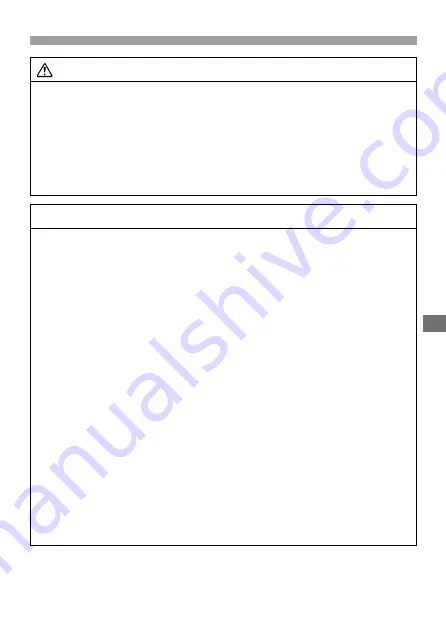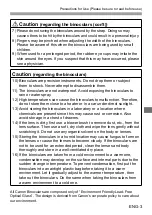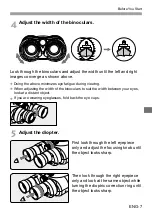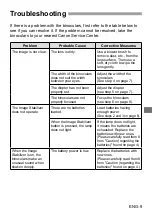
ENG-3
Precautions for Use (Please be sure to read before use)
Caution
(regarding the binoculars (con't))
7) Please do not swing the binoculars around by the strap. Doing so may
cause others to be hit by the binoculars and could result in a personal injury.
8) Fingers may be pinched when adjusting the width of the binoculars.
Please be aware of this when the binoculars are being used by small
children.
9) When used for a prolonged period, the rubber eye cups may irritate the
skin around the eyes. If you suspect that this may have occurred, please
see a physician.
Caution
(regarding the binoculars)
10) Binoculars are precision instruments. Do not drop them or subject
them to shock. Never attempt to disassemble them.
11) The binoculars are not waterproof. Avoid exposing the binoculars to
rain or water spray.
12) High temperatures can cause the binoculars to malfunction. Therefore,
do not store them close to a heater or in a car under direct sunlight.
13) Avoid storing the binoculars in a laboratory or a location where
chemicals are present since this may cause rust or corrosion. Also
avoid storage in a chest of drawers.
14) If the lens is dirty, first use a blower brush to remove dust, etc., from the
lens surface. Then use a soft, dry cloth and wipe the lens gently without
scratching it. Do not use any organic solvent on the body or lenses.
15) Storing the binoculars in a humid location may cause fungus to form on
the lenses or cause the lenses to become cloudy. If the binoculars are
not to be used for an extended period, clean the lenses and body
thoroughly and store in a well-ventilated dry place.
16) If the binoculars are taken from a cold environment to a warm one,
condensation may develop on the surface and internal parts due to the
sudden change in temperature. To prevent condensation, first put the
binoculars into an airtight plastic bag before taking it to a warm
environment. Let it gradually adjust to the warmer temperature, then
take out the binoculars. Do the same when taking the binoculars from
a warm environment to a cold one.
All Canon Binoculars are composed only of “Environment Friendly Lead-Free
Optical Glass”. The design is derived from Canon’s corporate policy to care about
our environment.

























